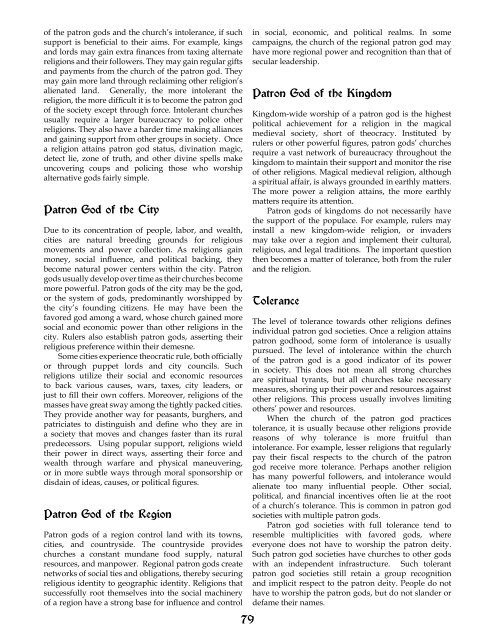Create successful ePaper yourself
Turn your PDF publications into a flip-book with our unique Google optimized e-Paper software.
of the patron gods and the church’s intolerance, if such<br />
support is beneficial to their aims. For example, kings<br />
and lords may gain extra finances from taxing alternate<br />
religions and their followers. They may gain regular gifts<br />
and payments from the church of the patron god. They<br />
may gain more land through reclaiming other religion’s<br />
alienated land. Generally, the more intolerant the<br />
religion, the more difficult it is to become the patron god<br />
of the society except through force. Intolerant churches<br />
usually require a larger bureaucracy to police other<br />
religions. They also have a harder time making alliances<br />
and gaining support from other groups in society. Once<br />
a religion attains patron god status, divination magic,<br />
detect lie, zone of truth, and other divine spells make<br />
uncovering coups and policing those who worship<br />
alternative gods fairly simple.<br />
Patron God of the City<br />
Due to its concentration of people, labor, and wealth,<br />
cities are natural breeding grounds for religious<br />
movements and power collection. As religions gain<br />
money, social influence, and political backing, they<br />
become natural power centers within the city. Patron<br />
gods usually develop over time as their churches become<br />
more powerful. Patron gods of the city may be the god,<br />
or the system of gods, predominantly worshipped by<br />
the city’s founding citizens. He may have been the<br />
favored god among a ward, whose church gained more<br />
social and economic power than other religions in the<br />
city. Rulers also establish patron gods, asserting their<br />
religious preference within their demesne.<br />
Some cities experience theocratic rule, both officially<br />
or through puppet lords and city councils. Such<br />
religions utilize their social and economic resources<br />
to back various causes, wars, taxes, city leaders, or<br />
just to fill their own coffers. Moreover, religions of the<br />
masses have great sway among the tightly packed cities.<br />
They provide another way for peasants, burghers, and<br />
patriciates to distinguish and define who they are in<br />
a society that moves and changes faster than its rural<br />
predecessors. Using popular support, religions wield<br />
their power in direct ways, asserting their force and<br />
wealth through warfare and physical maneuvering,<br />
or in more subtle ways through moral sponsorship or<br />
disdain of ideas, causes, or political figures.<br />
Patron God of the Region<br />
Patron gods of a region control land with its towns,<br />
cities, and countryside. The countryside provides<br />
churches a constant mundane food supply, natural<br />
resources, and manpower. Regional patron gods create<br />
networks of social ties and obligations, thereby securing<br />
religious identity to geographic identity. Religions that<br />
successfully root themselves into the social machinery<br />
of a region have a strong base for influence and control<br />
79<br />
in social, economic, and political realms. In some<br />
campaigns, the church of the regional patron god may<br />
have more regional power and recognition than that of<br />
secular leadership.<br />
Patron God of the Kingdom<br />
Kingdom-wide worship of a patron god is the highest<br />
political achievement for a religion in the magical<br />
medieval society, short of theocracy. Instituted by<br />
rulers or other powerful figures, patron gods’ churches<br />
require a vast network of bureaucracy throughout the<br />
kingdom to maintain their support and monitor the rise<br />
of other religions. <strong>Magical</strong> medieval religion, although<br />
a spiritual affair, is always grounded in earthly matters.<br />
The more power a religion attains, the more earthly<br />
matters require its attention.<br />
Patron gods of kingdoms do not necessarily have<br />
the support of the populace. For example, rulers may<br />
install a new kingdom-wide religion, or invaders<br />
may take over a region and implement their cultural,<br />
religious, and legal traditions. The important question<br />
then becomes a matter of tolerance, both from the ruler<br />
and the religion.<br />
Tolerance<br />
The level of tolerance towards other religions defines<br />
individual patron god societies. Once a religion attains<br />
patron godhood, some form of intolerance is usually<br />
pursued. The level of intolerance within the church<br />
of the patron god is a good indicator of its power<br />
in society. This does not mean all strong churches<br />
are spiritual tyrants, but all churches take necessary<br />
measures, shoring up their power and resources against<br />
other religions. This process usually involves limiting<br />
others’ power and resources.<br />
When the church of the patron god practices<br />
tolerance, it is usually because other religions provide<br />
reasons of why tolerance is more fruitful than<br />
intolerance. For example, lesser religions that regularly<br />
pay their fiscal respects to the church of the patron<br />
god receive more tolerance. Perhaps another religion<br />
has many powerful followers, and intolerance would<br />
alienate too many influential people. Other social,<br />
political, and financial incentives often lie at the root<br />
of a church’s tolerance. This is common in patron god<br />
societies with multiple patron gods.<br />
Patron god societies with full tolerance tend to<br />
resemble multiplicities with favored gods, where<br />
everyone does not have to worship the patron deity.<br />
Such patron god societies have churches to other gods<br />
with an independent infrastructure. Such tolerant<br />
patron god societies still retain a group recognition<br />
and implicit respect to the patron deity. People do not<br />
have to worship the patron gods, but do not slander or<br />
defame their names.




